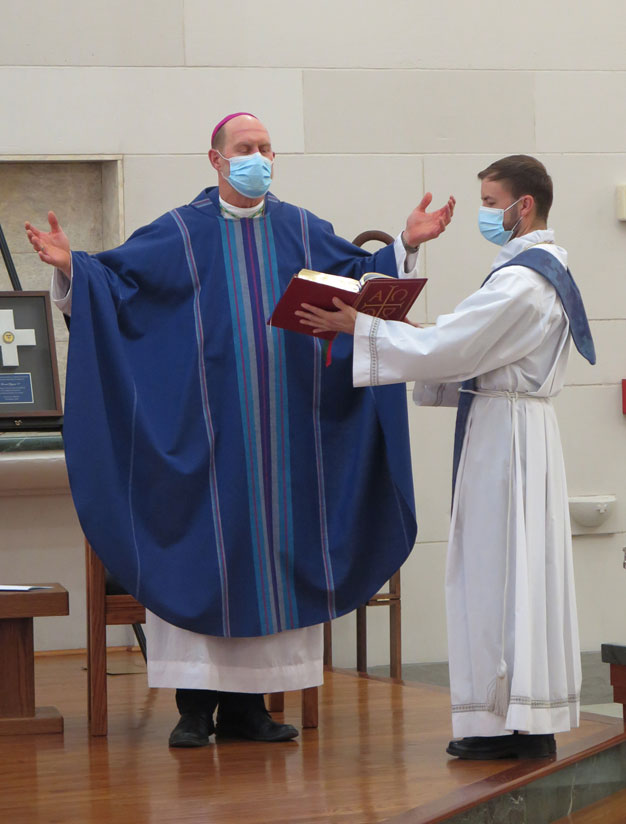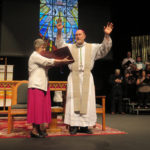
Bishop Thomas Zinkula prays the collect during Mass at St. Ambrose University in Davenport on Dec. 6. Also pictured is Father Thom Hennen, chaplain of the university.
By Deacon Frank Agnoli
For The Catholic Messenger
If you go to Mass on Ash Wednesday, or watch it at home, you may notice a small change at the end of the opening prayer. The prayer, technically known as the Collect, used to end: “Through our Lord Jesus Christ, your Son, who lives and reigns with you in the unity of the Holy Spirit, one God, for ever and ever.” But, beginning on Ash Wednesday, you should start hearing: “Through our Lord Jesus Christ, your Son, who lives and reigns with you in the unity of the Holy Spirit, God, for ever and ever.” Maybe, if you read quickly, you didn’t even catch it. The word “one” is being dropped.
If you remember, we received a new translation of the Roman Missal, the book of prayers used at Mass, in 2011. In preparing for the new Missal, we published a series of articles here in the Messenger. In 2009, I wrote about this very change, noting that the word “one” was being dropped. The Latin original reads: Qui tecum vivit et regnat in unitáte Spíritus Sancti, Deus, per ómnia sǽcula sæculórum. There is no “one” in front of God (Deus) in the Latin text. In addition, “God” in the final line refers to Christ, and not to the Holy Trinity. However, by the next year, the word was back in and that’s what we got in the final version. Fast forward 10 years. The Congregation for Divine Worship and the Discipline of the Sacraments is now asking that we take the “one” back out! Other languages, like Spanish, don’t have this problem.
Therefore, the U.S. bishops approved, and Rome confirmed, changes to paragraph 54 of the General Instruction of the Roman Missal (GIRM; see box on Page 9). The GIRM is the section of the Missal that explains how to celebrate the Mass. So, beginning this Ash Wednesday, the words “one God, for ever and ever” are simply going to be replaced with “God, for ever and ever” at the end of the Collect.
Parishes don’t have to buy new books; the priest (or deacon at other rites) just needs to remember to skip the word “one.” Publishers are being informed of this change, and any reprints or new editions of the Missal and other ritual books will reflect the new translation. Other publications, such as the missalette that you have in your pews, will have the new text as soon as possible. However, many of these are printed months before they are shipped, so it will be a while before the change appears.
The more accurate translation is a good reminder (as we mentioned back in 2009!) that, as Christians, we make our prayer to the Father, through the Son (who is also God), in the unity of the Holy Spirit. Christ’s divinity is being stressed; a key truth of our faith. So maybe not that small of a change after all!
Paragraph 54 of the General Instruction of the Roman Missal, revised
The Collect
54. Next the Priest calls upon the people to pray and everybody, together with the Priest, observes a brief silence so that they may become aware of being in God’s presence and may call to mind their intentions. Then the Priest pronounces the prayer usually called the “Collect” and through which the character of the celebration finds expression. By an ancient tradition of the Church, the Collect prayer is usually addressed to God the Father, through Christ, in the Holy Spirit, 56 and is concluded with a Trinitarian ending, or longer ending, in the following manner:
— If the prayer is directed to the Father: Through our Lord Jesus Christ, your Son, who lives and reigns with you in the unity of the Holy Spirit, God, for ever and ever;
— If it is directed to the Father, but the Son is mentioned at the end: Who lives and reigns with you in the unity of the Holy Spirit, God, for ever and ever;
— If it is directed to the Son: Who live and reign with God the Father in the unity of the Holy Spirit, God, for ever and ever.
The people, joining in this petition, make the prayer their own by means of the acclamation Amen.
At Mass only a single Collect is ever said.
56 Cf. Tertullian, Adversus Marcionem, IV, 9: Corpus Christianorum, Series Latina 1, p. 560; Origen, Disputatio cum Heracleida, no. 4, 24: Sources chrétiennes 67, p. 62; Statuta Concilii Hipponensis Breviata, no. 21: Corpus Christianorum, Series latina 149, p. 39.











